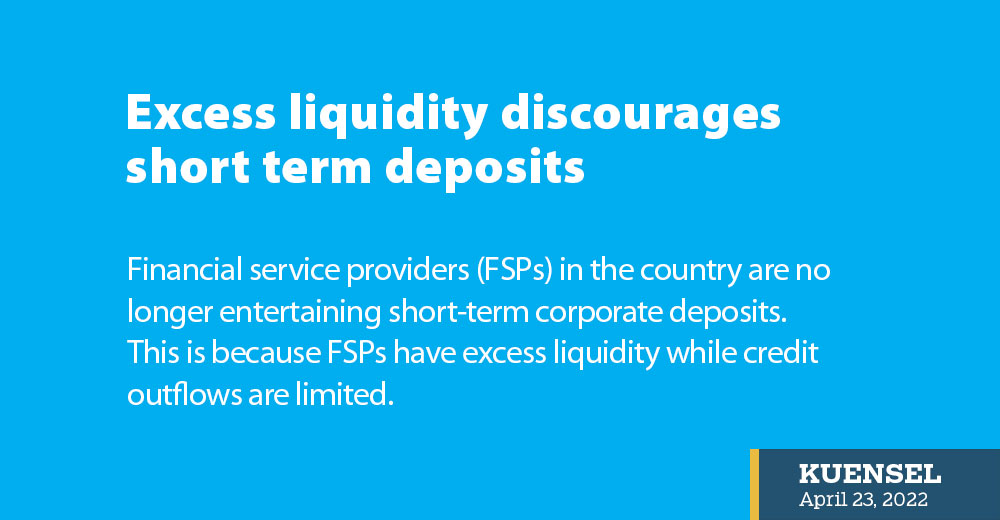Banks not accepting corporate deposit
Dechen Dolkar
Financial service providers (FSPs) in the country are no longer entertaining short-term corporate deposits.
This is because FSPs have excess liquidity while credit outflows are limited. Few banks, however, accept corporate deposits with negotiated interest rates meaning interest rates that the banks are offering are low compared to when banks were doing well.
Bank of Bhutan (BoB), interest rates for the fixed deposits of corporations starts from 0.75 percent to 8.25 percent depending on the number of years. Bhutan National Bank (BNB) interest rate for fixed deposits of corporate deposits starts from 1.5 percent to 9 percent depending on the number of years.
However, BNB has mentioned that corporate deposits above Nu 50M will be accepted at negotiated rates, and not necessarily at published rates.
Recently, when one of the corporations wanted to deposit the money, it was not accepted by two banks stating that they are not able to offer the interest rates. They said that they are not in the position to accept any deposits for the time being because of the current liquidity positions of the banks.
However, one of the banks has accepted the deposit with negotiated interest rates.
Officials from BoB said that they have not stopped taking corporate deposits. However, as a business strategy for the time being, they are accepting only long-term deposits from corporate clients.
“Short term deposits are not adding value to the business and as a commercial bank, we have to look at the return from our lending,” a BoB official said. Officials from Tbank said that they accept corporate deposits at negotiated interest rates.
The official said that they used to offer higher interest rates earlier, but due to excess liquidity and poor credit flow, they are offering deposits at negotiated interest rates if the corporation agrees.
“We have received a few corporate deposits from the corporations and we are in the processing of negotiating,” the official said.
Interest rate depends on the cost of the fund position.
BNB CEO, Sonam Tobgay, said that bank had been negotiating interest rates for a long time back and they have been accepting corporate bulk deposits with negotiated interest rates.
The finance minister Namgay Tshering said that corporate deposits are by nature short-term and banks are accepting the corporate deposits.
However, Lyonpo said that banks accept negotiated interest rates because they have enough liquidity.
“If they don’t negotiate the interest rates, it is imposing additional liability to the banks and banks cannot invest the corporate deposits as and when they are required,” Lyonpo said.
Lyonpo said that banks will be most welcoming if the corporate deposits are deposited as current deposits because it will not have any liability to the banks.
When asked about the excess liquidity and poor investment, Lyonpo said that until now due to the pandemic protocol, the overall economy was down with poor investment and poor credit flow.
“Now with the restriction lifted, the economy will gradually pick up pace and credit demand will grow,” Lyonpo said.
According to the Royal Monetary Authority’s annual FY 2020-2021 report, the short-term liquidity surplus stood at Nu 35.22B, an increase by 74.5 percent from the previous year, which is adequate to support the short-term liquidity demand of the economy.
Thus, the banks, in particular, remained well placed to play a catalytic role in supporting the process of economic recovery.
As of June 2021, the BoB held a share of over 52.2 percent of the overall liquidity surplus, as the bank continues to maintain a large portion of current account deposits of the public sector.
As of October 6, 2021, based on the weekly information received from the banks, it has been observed that there is a persistent liquidity surplus in the market.
Despite the negative net flows, banks continue to have sufficient current account balance maintained with the RMA to meet their expected liquidity outflows.


